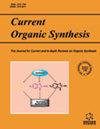高氯酸锶催化合成二氢嘧啶立体选择性新方案的反应优化
IF 2.5
4区 化学
Q3 CHEMISTRY, ORGANIC
引用次数: 0
摘要
水合高氯酸锶[Sr(ClO4)2.3H2O]作为非常强的氧化剂和脱水剂。到目前为止,它还不能作为一种基于脱水机理的有机合成反应的催化剂进行报道。因此,研究它是否能成为一锅多组分反应(MCRs)的有效催化剂具有重要意义。本工作的主要目的是开发一种以水合Sr(ClO4)2为催化剂,通过一锅多成分策略合成1,4-二氢嘧啶酮的新工艺。此外,还包括合成化合物的工艺优化、立体选择性和光谱表征。使用20mol%的水合Sr(ClO4)2催化剂,通过一锅无溶剂反应合成1,4-二氢嘧啶酮是一种新的催化MCR方法。box-Behnken设计方法和先进的分析技术被用于工艺优化和反应分析。结果证实,在常规加热和微波加热下,水合Sr(ClO4)2是一锅多组分有机合成的有效催化剂。它是实验室合成1,4-二氢嘧啶酮的有效催化剂,具有中等至优异的产率,没有任何不良影响。微波加热在1-4分钟内提供了所需的产品。此外,该方法提供了简单地通过重结晶而不使用色谱纯化方法的纯产物的容易分离。反应条件的简单性和中立性、反应后处理的容易性、较高的产率、有效性和底物的多样性等,使水合Sr(ClO4)2催化剂为立体选择性合成1,4-二氢嘧啶酮提供了一种高效的方法。此外,已经发现它在实验室反应条件下是安全的,并且在该过程中没有遇到不希望的问题。本文章由计算机程序翻译,如有差异,请以英文原文为准。
Reaction Optimization of Strontium Perchlorate Catalyzed Novel Protocol for Stereoselective Synthesis of Dihydropyrimidinones
Hydrated strontium perchlorate [Sr(ClO4)2.3H2O] acts as a very strong oxidizing and dehydrating agent. Until now, it could not be reported as a catalyst in dehydration mechanism-based organic synthetic reactions. Therefore, it is important to find whether it could be an effective catalyst for one-pot multicomponent reactions (MCRs).
The main objective of the present work is the development of a novel process for the synthesis of 1,4-dihydropyrimidinones through the one-pot multicomponent strategy using hydrated Sr(ClO4)2 as a catalyst. Furthermore, it includes process optimization, stereoselectivity, and spectroscopic characterization of the synthesized compounds.
Conventional and microwave-supported synthesis of 1,4-dihydropyrimidinones using 20 mol % of hydrated Sr(ClO4)2 catalyst via the one-pot solvent-free reaction was discovered as a new catalytic MCR methodology. The box-Behnken design approach and advanced analytical techniques were used for process optimization and reaction analysis.
The results confirmed that hydrated Sr(ClO4)2 works as an efficient catalyst for one-pot multicomponent organic synthesis under both conventional and microwave heating. It is an effective catalyst for laboratory synthesis of 1,4-dihydropyrimidinones stereoselectively with moderate to excellent yield without any undesirable effect. Microwave heating provided the desired product within 1-4 minutes. Moreover, this method provides easy isolation of the pure products simply by recrystallization, and without the use of a chromatographic purification method.
The simplicity and neutrality of reaction conditions, easy post-reaction workup, higher satisfactory to excellent yield, effectiveness, the diversity of substrates, etc. render the hydrated Sr(ClO4)2 catalyst-based protocol for the stereoselective synthesis of 1,4-dihydropyrimidinones as a highly efficient method. Furthermore, it has been found to be safe under laboratory reaction conditions and no undesirable issues have been faced during the process.
求助全文
通过发布文献求助,成功后即可免费获取论文全文。
去求助
来源期刊

Current organic synthesis
化学-有机化学
CiteScore
3.40
自引率
5.60%
发文量
86
审稿时长
6-12 weeks
期刊介绍:
Current Organic Synthesis publishes in-depth reviews, original research articles and letter/short communications on all areas of synthetic organic chemistry i.e. asymmetric synthesis, organometallic chemistry, novel synthetic approaches to complex organic molecules, carbohydrates, polymers, protein chemistry, DNA chemistry, supramolecular chemistry, molecular recognition and new synthetic methods in organic chemistry. The frontier reviews provide the current state of knowledge in these fields and are written by experts who are internationally known for their eminent research contributions. The journal is essential reading to all synthetic organic chemists. Current Organic Synthesis should prove to be of great interest to synthetic chemists in academia and industry who wish to keep abreast with recent developments in key fields of organic synthesis.
 求助内容:
求助内容: 应助结果提醒方式:
应助结果提醒方式:


